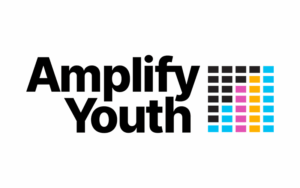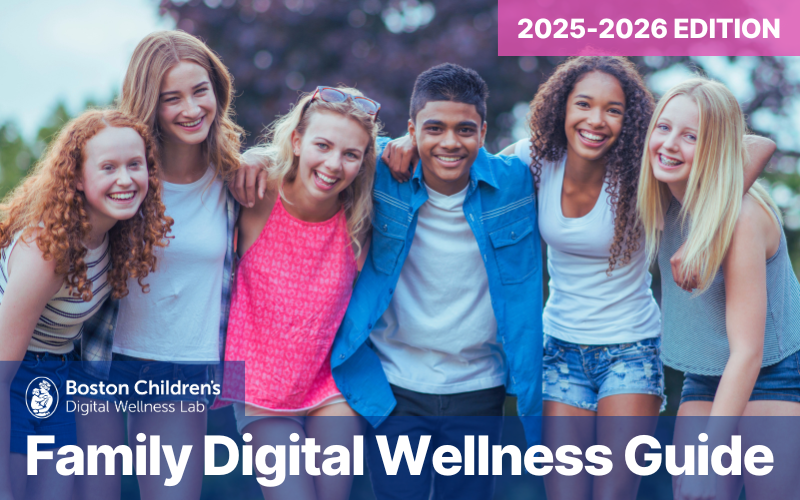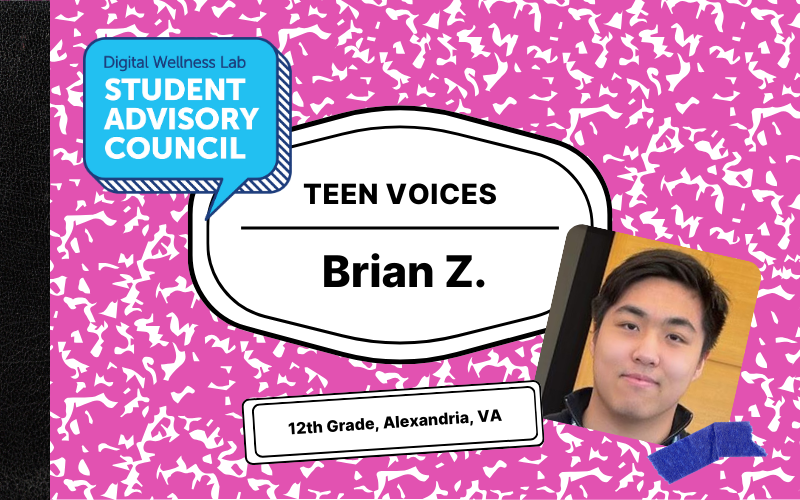Brian Z. is a member of the Digital Wellness Lab’s 2023-24 Student Advisory Council. He has thought deeply about how to make the internet healthier for young people.
What does a “day in the life” look like for you with using technology and digital media?
I’m broadly interested in discussions surrounding both the governance and applications of tech and digital media. In the policy space, I work as an advisor to Encode Justice and Fidutam and chair the SPRING Group, where I’m working with regulators and policymakers on approaches to governing AI and other technologies. I’ve had the opportunity to leverage technology and digital media to help make inroads toward answering these questions and making a difference in this space, and definitely believe that technology has the power to mobilize advocates in a multitude of ways, whether students are calling on their representatives to halt H.R. 752 (the TikTok bill) or chiming in on Trust and Safety as part of the Digital Wellness Lab’s youth advisory council.
In the day-to-day, my school is pretty big on using technology, and teachers have varying approaches to how we use laptops to learn. In the CS department, using computers is practically a must – a lot of our class time is spent coding solutions for projects, so we’re using computers in some way or another. In other classes, some of our teachers are pretty big on using physical copies of handouts for annotating purposes, while other teachers have shifted to teach fully on Schoology (a learning management software), having us make copies of Google Docs where we annotate and take notes. They also have online agendas and class calendars that we can browse, which really helps with finding due dates. Over the past year, there’s been a county-wide enforced ban on cell phones during instructional time, so I’ve seen more and more blue cell phone ‘jails’ pop up on classroom doors and walls. As a result, we’ve started using our phones less and less in the classroom, but laptop use is more prevalent than ever.
At home, a lot of the time I end up having to be on my computer just because of how much of my assigned homework is online. Usually, I’ll have some music playing on Spotify or a YouTube podcast going for some background noise, and I definitely get distracted from things I’m working on to chat with friends online or take a break by playing games. Recently I’ve become obsessed over Pokémon Sleep, so I’ve started tracking my (admittedly terrible) sleep schedule on my phone. Me and a lot of my peers often stay connected at home through social media and messaging every day, using a whole host of platforms to stay connected from Facebook Messenger to Discord. We use these platforms to stay in touch, work on projects, and organize hangouts. Technology’s also expanded the scope of people I’m able to stay in touch with- I often meet friends at competitions or tournaments across the country, and we’re able to stay in touch even after we’re thousands of miles away. I’ve met some of my best friends through meeting people in-person and staying in touch online! In some ways, this is a blessing and a curse- since it’s very easy to reach someone, there’s definitely times where many of us (myself included) read too much into things when someone replies or how long it’s taking someone to reply. What before was normalized is now odd if it takes someone a long time to reply, and it’s critical for everyone to find a balance in the ‘obligation’ to respond to others with their own health using social media.
What are your favorite platforms/apps and why?
Facebook/Messenger: it’s definitely an odd choice, but all of our school clubs have Facebook groups that end up dating back to 2013, so basically everyone at our school has Facebook to chat with friends and catch up on school information. Coincidentally, my friends on the debate circuit also use it to scout teams and talk at tournaments, so it’s been my go-to way to talk with friends in high school. It seems like Facebook got adopted by debate and my school back when it was cool and it managed to hang around!
YouTube/Instagram: Maybe I’m just aging out in my refusal to download TikTok, but consuming content now takes up a lot of my time in my daily life. I personally have found Instagram Reels to have much funnier content and YouTube Shorts have pretty interesting 60-second videos that make me interested in a longer form YouTube video.
Reddit: Reddit is such a goldmine of information on anything, including nice looking graphics! I have notifications turned on for r/vexillology, r/imaginarymaps, and a bunch of other subreddits ranging from academic including r/compsocial to just games like r/minecraft. It’s so cool to me that there’s so many places on Reddit for nearly anything, and a lot of the time a niche question I’ll have will have an answer on Reddit from years ago.
Spotify: I really love how many playlists Spotify auto generates for me based on my tastes; usually I’ll just listen to my Discover Weekly or the dozens of other blends/playlists that Spotify creates. There’s also a new DJ feature which is really cool, and I’ve heard some songs that I haven’t listened to in years resurface back up.
“Although it’s certainly not the majority of teens, a growing number of teens are using technology to do amazing things too, whether that’s organizing millions of teens to go out and vote or starting up businesses tackling real problems in the world…”
What are the greatest opportunities you see for teens when it comes to using technology?
Accessible technology is a great equalizer when it comes to academics and finding opportunities; so many resources now exist like Crash Course on YouTube and Art of Problem Solving’s books and online web forum that solely exist to help students learn more about topics from world history and biology to math and competitive problem solving, which were much more exclusive just years ago. You can take free classes from amazing universities through MOOCs like edX and Coursera and learn just about anything by surfing Wikipedia or the web. Growing up, Crash Course carried me through a lot of classes that I was learning!
Beyond just learning in school, technology has made us waay more skilled at just about anything! The barrier for us to learn new skills and things has drastically lowered; we can just find a YouTube video to fix some niche software issue with our computer that previously would’ve needed us to take it in to a technician or leaf through a manual to figure out; I follow LinusTechTips and basically just learned how to build a computer through watching a bunch of YouTube videos, which was really cool.
Although it’s certainly not the majority of teens, a growing number of teens are using technology to do amazing things too, whether that’s organizing millions of teens to go out and vote or starting up businesses tackling real problems in the world with knowledge and skills that they picked up from Coursera and YouTube. It’s much easier in this day and age for us to “find our people”; instead of prior generations where fame and influence was heavily restricted based on just the limited coverage of TV or print, there’s probably millions of small to big teen influencers in our generation that have thousands to millions of followers for any reason!
It’s also helped with staying connected to family and friends; my grandparents in Canada are just one video call away, and I can stay in touch with friends that are on the other side of the world. It’s definitely amazing how much messaging (and phones) have evolved from when I was little, going from answering machines to small Blackberries to the huge iPhones now.
“Since we’re the first generation to have even grown up with a digital footprint, we’re in vastly uncharted territory with how that will be used in the future. It’s something I’m pretty scared about…”
What are the greatest challenges you see for teens when it comes to using technology?
I think the biggest challenge right now is figuring out a way to balance our digital habits with our wellbeing. It’s really easy to lose track of time on anything now!
There’s also other issues as well – I’ve grown up really conscious about my digital footprint; for the longest time, I didn’t post anything on my personal Instagram, but finally caved to post photos of what I baked during COVID and hanging out with friends after lockdown started winding down. Since we’re the first generation to have even grown up with a digital footprint, we’re in vastly uncharted territory with how that will be used in the future. It’s something I’m pretty scared about, especially when reading stories about celebrities or others having something from ages ago or a message used against them and why I’m really supportive of ongoing digital privacy initiatives (especially for children on the internet) like the right to be forgotten.
I’ve really benefited from having YouTube as a learning source to learn more about business, science, and everything in between, but I often see a lot of ‘critical documentaries’ about various influencers; it’s a huge challenge to spot biases, sponsorships, and motives in the content I’m consuming. Maybe this isn’t an ongoing debate; I remember growing up, there was a large debate about how Columbus should be taught and remembered in the classrooms. Now, that debate has just shifted to other areas, such as critiques of the journalistic methods of YouTuber Johnny Harris when he argues about Columbus. Technology has definitely created infinitely more platforms where we can learn, but it also risks harming the quality of what we learn.
What are the greatest opportunities you have and challenges you personally face when it comes to managing your technology use?
The greatest opportunity I see from my technology use is in building and forming relationships. I’ve been able to make so many more friends beyond my school through debate, Minecraft, and other online communities, and connect with professionals and others to gain access to opportunities through LinkedIn. However, there are definitely also times where communicating with friends is more difficult without facial expressions and the benefits of in-person communications. I often feel like I come off as passive aggressive when messaging and can’t really ‘read’ what the person I’m talking to is feeling or thinking.
“I think the reason why I think I have a happier relationship with social media was because I didn’t have a phone (and thus wasn’t on major social media platforms) until I was a freshman in high school.”
What would you want to see changed or redesigned for technology and/or media to be healthier for teens?
A ban on infinite scrolling algorithms. If a ban is too infeasible, it would be great to bring back older functions where you would have to actively click “more” to keep scrolling through content (like Google search), or have set timer functions for specific parts of the app. Messaging with my friends on Instagram might take hours, but I really don’t want to be doom scrolling for more than 10 minutes every 6 hours. Surely there’s some way to create more targeted screentime locks?
Better practices finding under-13 users. This is what a lot of the Meta lawsuit is about, but digital platforms need to do a better job finding these users and providing an experience that is: 1) Safer in the content recommended. Platforms like YouTube have done a bad job filtering intentionally graphic and content not safe for minors from even the kids-friendly platform. 2) Designed to have time limits or less addictive algorithms. Ideally this would apply towards everyone and not just minors, but this would be a great step to build healthy habits with social media. 3) If at all possible, not-for-profit. TH Chan had a really great study highlighting how much platforms make from minors: This would remove the incentive for addictive algorithms as platforms wouldn’t profit off of a kid’s use of the platform in the first place.
I believe these three things could make technology/media healthier for us as teens by building better relationships with social media from the start, instead of having bad habits/relationships with social media entrench themselves. However, there are definitely questions of how we can protect user privacy and implement these without requiring ID or parental permission. I think the reason why I think I have a happier relationship with social media was because I didn’t have a phone (and thus wasn’t on major social media platforms) until I was a freshman in high school. I’m incredibly passionate about the third issue and am hoping to start a movement this year to call upon legislation to enact this! The FTC is floating banning profiting off of selling the data of minors; I think this is a step in the right direction!
What, if anything, do you think parents and caregivers are missing when it comes to understanding how teens use media?
Something my parents like to often tell me is to read more books and that they don’t see me working on schoolwork anymore since it’s not on paper. But I disagree. I’m reading the Washington Post; it’s just online. I’m going through my textbook; it’s just online. No, I’m not going through the other textbook; YouTube teaches me better! I think this is a pretty big disconnect that is driven from the differences between what we see as normal now and what our parents expect to see based on their own experiences growing up. This is also totally normal without technology.
I think a lot of a parent’s worries (like their kid is slacking off or doing something nefarious), get amplified with technology; at the end of the day, it’s still about communicating and setting boundaries with your child.
What guidance or advice do you have for parents and other caregivers to help teens to build and maintain healthy behaviors around digital media and technology?
One thing I do want to set the record straight on: it’s almost never possible to confiscate or regulate our use of media and technology! If you take our devices away, we’ll borrow a friend’s at school. If you set parental controls up, we’ll spend all day and night figuring out how to take them down (or look over your shoulder when you enter the password). Instead, try non-harmful methods that don’t restrict our usage of technology; restricting our use will likely make us want to use it even more. Instead, incentivize us to do better. Set up screentime trackers that you can track without using them to block times. Treat your child with a reward (like ice cream!) if they have healthy habits on social media. Communicate that you’re okay with us taking a break to play games as long as we’re on top of our assignments. Work with us instead of against us!
Brian Z. is a member of the 2023-24 Digital Wellness Lab’s Student Advisory Council. He is a high school senior in Alexandria, Virginia.
Here at the Lab, we welcome different viewpoints and perspectives. However, the opinions and ideas expressed here do not necessarily represent the views, research, or recommendations of the Digital Wellness Lab, Boston Children’s Hospital, or affiliates.








